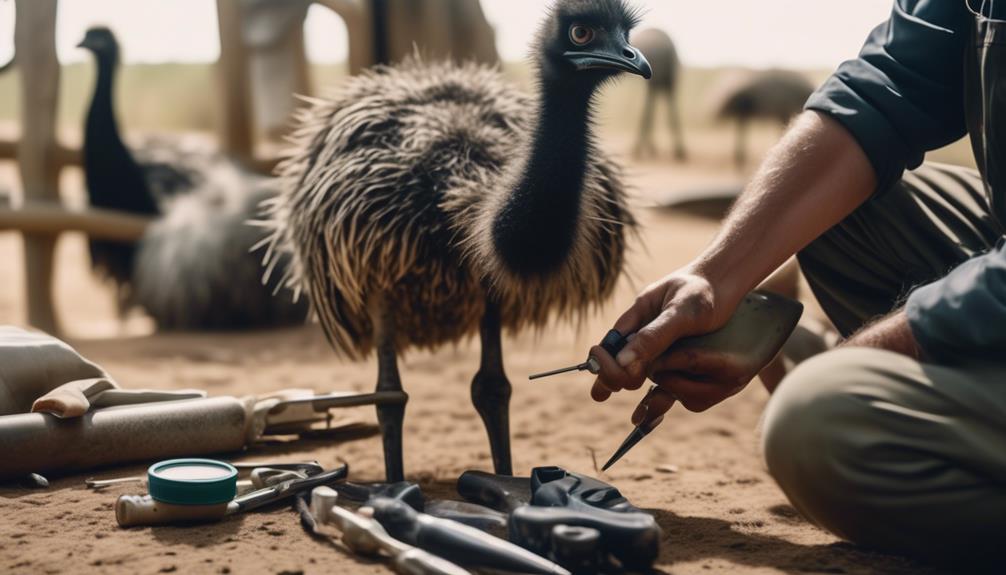
Did you know that emu farming has seen a significant increase in recent years, with the global emu meat market projected to reach a value of $986 million by 2027?
However, amidst this growing industry, there are several challenges that emu farmers face. Extreme weather conditions, predator threats, and disease outbreaks are just a few of the obstacles that can impact the success of emu farming.
In this discussion, we will explore these challenges and delve into the strategies employed by farmers to protect their emus and ensure their overall well-being.
So, let's dive into the fascinating world of emu farming and uncover the complexities that come with it.
Extreme Weather Conditions

Emu farmers face significant challenges due to the impact of extreme weather conditions on their operations. Adapting to climate change is crucial for their survival. With the increasing frequency and intensity of extreme weather events, such as droughts, floods, and heatwaves, emu farmers must be prepared to protect their birds and maintain the profitability of their businesses.
To address these challenges, emu farmers must develop robust emergency response plans. These plans should include measures to mitigate the effects of extreme weather conditions, such as providing adequate shade and shelter for the emus, implementing irrigation systems to combat drought, and ensuring proper ventilation to alleviate heat stress. Additionally, farmers should consider diversifying their farming practices to include other resilient livestock or crops that are less susceptible to extreme weather events.
Furthermore, emu farmers need to closely monitor climate patterns and make informed decisions based on weather forecasts. This will enable them to take proactive measures, such as adjusting feeding schedules and water management practices, to minimize the impact of extreme weather conditions on their emus' health and overall productivity.
Predator Threats
To effectively safeguard the emu farm from potential predator threats, it's essential to implement comprehensive and strategic predator management strategies. Emus, being flightless birds, are vulnerable to a wide range of predators, including foxes, dogs, coyotes, and birds of prey. These predators pose a significant risk to the emus' safety, as well as the productivity and profitability of the farm.
Effective predator management begins with identifying and understanding the specific wildlife interactions occurring on the farm. Conducting regular surveys and monitoring the farm's surroundings can help identify potential predator hotspots and assess the risk levels. By understanding the behaviors and habitats of these predators, appropriate management techniques can be implemented to deter and control their presence.
Physical barriers such as sturdy fences and netting can be installed to prevent predators from accessing the emu farm. It's crucial to ensure that these barriers are properly maintained and regularly inspected to prevent any breaches. Additionally, implementing scare tactics like noise devices, reflective materials, and motion-activated lights can help deter predators and disrupt their hunting patterns.
Another effective predator management strategy involves the use of guardian animals, such as livestock guardian dogs or llamas. These animals are trained to protect the emus by patrolling the farm, barking, and exhibiting aggressive behavior towards potential threats. Their presence alone can serve as a deterrent for predators.
Regular monitoring and evaluation of the predator management strategies are vital to ensure their effectiveness. By staying vigilant and adapting techniques as needed, the emu farm can minimize the risk of predator attacks and create a safe environment for the emus to thrive.
Disease Outbreaks

Are disease outbreaks a significant concern for emu farmers, and what measures can be taken to prevent and manage them effectively?
Disease outbreaks pose a significant threat to emu farmers, as they can result in devastating consequences for both the birds and the business. To prevent and manage these outbreaks effectively, emu farmers should consider the following measures:
- Implement strict biosecurity protocols: Emu farms should have strict biosecurity measures in place to prevent the introduction and spread of diseases. This includes limiting visitors, disinfecting equipment and footwear, and practicing proper waste management.
- Regular health monitoring: Emu farmers should regularly monitor the health of their birds to detect any signs of disease early on. This can be done through regular veterinary check-ups, observation of behavior and appearance, and routine testing for common diseases.
- Vaccination programs: Vaccinating emus against common diseases can significantly reduce the risk of outbreaks. Emu farmers should work closely with veterinarians to develop and implement vaccination programs tailored to their specific needs.
Protecting Emus From Harsh Climates
Implementing effective strategies to protect emus from the challenges of harsh climates is crucial for the overall health and well-being of these birds. Emus are native to Australia, where they've evolved to withstand a range of weather conditions. However, when emus are farmed in different climates, such as in colder regions or areas with extreme heat, additional measures must be taken to ensure their welfare.
One of the key solutions to protecting emus from harsh climates is the provision of suitable shelter. Emu shelter solutions should be designed to provide insulation and protection from extreme temperatures, as well as adequate ventilation to prevent humidity buildup. This can be achieved through the use of insulated housing structures that are well-ventilated and provide a comfortable environment for the emus.
Furthermore, emu breeding techniques can also play a role in adapting to harsh climates. Selective breeding for traits such as heat or cold tolerance can help produce emus that are more resilient to extreme weather conditions. By focusing on genetic diversity and breeding for desirable traits, emu farmers can ensure that their birds are better equipped to handle the challenges posed by harsh climates.
Implementing Predator Deterrence Measures

Predator deterrence measures are essential for the protection of emus on farms and require careful planning and implementation. Implementing effective predator control techniques ensures the safety and well-being of emus, preventing potential losses due to predation. Here are three proven predator deterrent techniques that can be employed on emu farms:
- Fencing: Installing sturdy and secure fencing around the emu enclosure is the first line of defense against predators. Choose fencing materials that are strong and difficult to penetrate, such as high-tensile wire or electric fencing. Ensure that the fencing is buried deep enough to prevent predators from digging under it.
- Guard animals: Utilizing guardian animals, such as dogs or llamas, can greatly enhance predator control on emu farms. These animals are instinctively protective and can help deter potential predators by their presence and territorial behavior. Introduce and train these animals to bond with the emus and establish a protective relationship.
- Motion-activated lights and sound devices: Installing motion-activated lights and sound devices around the emu enclosure can startle and discourage predators. These devices, when triggered by movement, emit bright lights and loud noises, mimicking human presence and deterring predators from approaching the emu area.
Implementing these predator deterrent techniques, along with monitoring and regular maintenance, will ensure the safety and security of emus on farms. By taking proactive measures, emu farmers can effectively control and minimize the risk of predation, safeguarding their valuable livestock.
Preventive Measures for Disease Control
To effectively control and mitigate the risk of disease in emus, it's crucial to implement a comprehensive set of preventive measures. Biosecurity measures play a vital role in disease prevention by minimizing the introduction and spread of pathogens in emu farms. These measures include strict control of visitors, vehicles, and equipment entering the farm premises. Visitors should be required to follow proper hygiene protocols, such as wearing protective clothing and sanitizing their hands before entering the farm. Regular cleaning and disinfection of the farm facilities, equipment, and vehicles are essential to reduce the risk of disease transmission.
In addition to biosecurity measures, vaccination protocols are essential for disease control in emus. Vaccinations help stimulate the bird's immune system, making them less susceptible to disease-causing pathogens. Emus should be vaccinated against common diseases, such as avian influenza, Newcastle disease, and fowl pox. Vaccination schedules should be strictly followed, and the vaccines used should be of high quality and administered by trained personnel to ensure maximum effectiveness.
Regular monitoring of emus for signs of illness and immediate isolation of sick birds is crucial to prevent the spread of diseases within the flock. It's also important to maintain a clean and hygienic environment, including proper waste management and regular cleaning of water sources. By implementing these preventive measures, emu farmers can significantly reduce the risk of disease and promote the overall health and well-being of their emus.
Recognizing and Managing Common Emu Diseases

When it comes to ensuring the health and well-being of your emus, it's imperative to be able to recognize and effectively manage common emu diseases. Early detection plays a crucial role in preventing the spread of diseases and minimizing their impact on your flock. Here are three key points to consider when it comes to recognizing and managing common emu diseases:
- Regular health checks: Conduct routine examinations of your emus to identify any signs of illness or abnormal behavior. Look for symptoms such as loss of appetite, weight loss, decreased activity, respiratory distress, or changes in droppings. By regularly monitoring your emus' health, you can catch any potential issues early on and take appropriate action.
- Vaccination programs: Implementing a comprehensive vaccination program is essential to protect your emus from common diseases. Consult with a veterinarian to determine the appropriate vaccines for your flock and establish a vaccination schedule. This will help to boost their immunity and prevent the onset of diseases that could be detrimental to their health.
- Quarantine and biosecurity measures: When introducing new emus to your flock, it's crucial to quarantine them for a period of time to prevent the spread of diseases. Additionally, practicing good biosecurity measures, such as proper sanitation, disinfection, and limiting access to your farm, can further reduce the risk of disease transmission.
Strategies for Ensuring Emu Health and Well-being
Implementing a comprehensive and proactive approach to managing the health and well-being of your emus is essential for ensuring their overall welfare and productivity. Two crucial aspects to consider are emu nutrition and diet, as well as emu breeding and reproductive health.
Emu nutrition and diet play a vital role in maintaining the health and productivity of your emus. It's essential to provide them with a balanced diet that meets their nutritional requirements. Emus are omnivorous, and their diet should consist of a combination of plant materials, such as fruits, vegetables, and grains, as well as animal proteins like insects and small vertebrates. It's crucial to ensure that emus have access to clean, fresh water at all times to prevent dehydration.
When it comes to emu breeding and reproductive health, careful management is necessary to ensure successful breeding and healthy offspring. Regular veterinary check-ups and reproductive health assessments are vital to detect any potential issues early on. Providing suitable nesting areas and monitoring the breeding process can help minimize the risk of complications. Additionally, maintaining proper hygiene and cleanliness in the breeding environment is crucial to prevent the spread of diseases.
Frequently Asked Questions
What Is the Average Lifespan of an Emu and How Does It Vary in Different Weather Conditions?
The average lifespan of an emu varies depending on weather conditions. In harsh climates, emus may have a shorter lifespan due to extreme temperatures and limited food sources. However, in more favorable weather, emus can live up to 20 years or more.
Are There Any Natural Predators That Specifically Target Emus and How Can Farmers Protect Their Emus From These Predators?
To protect your emus from natural predators, implement effective predator deterrence strategies. Emu farming faces challenges in this regard, but you can utilize measures such as secure enclosures, electric fencing, and guard animals to safeguard your emus.
Can Emus Be Vaccinated Against Common Diseases and What Are the Recommended Preventive Measures for Disease Control in Emu Farming?
Emu vaccination is crucial for disease control in emu farming. Recommended preventive measures include regular vaccination schedules, maintaining clean and hygienic conditions, implementing biosecurity protocols, and monitoring emus for any signs of illness.
Are There Any Specific Signs or Symptoms That Can Help Farmers Recognize the Presence of Common Emu Diseases, and How Should These Diseases Be Managed?
Recognizing emu diseases is crucial for effective disease management. Keep an eye out for signs like lethargy, loss of appetite, and abnormal feces. Once identified, promptly isolate and treat affected birds to prevent further spread.
Apart From Implementing Predator Deterrence Measures, What Other Strategies Can Farmers Use to Ensure the Overall Health and Well-Being of Their Emus?
To ensure the overall health and well-being of your emus, apart from predator deterrence, consider alternative strategies. Focus on meeting their nutritional needs through balanced diets, proper feeding schedules, and access to clean water.
Conclusion
In the world of emu farming, you must weather the storms, both figuratively and literally. From extreme weather conditions and predator threats to disease outbreaks, these challenges are ever-present.
However, by implementing preventive measures, such as protecting emus from harsh climates and employing predator deterrence measures, you can ensure their health and well-being.
Remember, just as the emus face adversity, so too do we in our own lives. But with determination and the right strategies, we can overcome any obstacle that comes our way.




